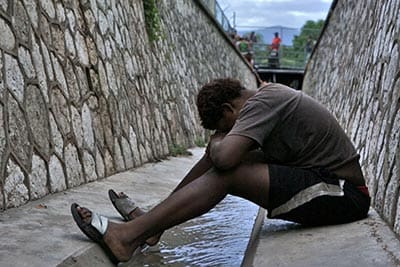LGBT JAMAICANS FACE “INTOLERABLE” LEVELS OF VIOLENCE

A homeless youth from the LGBT community sits in the sewer where he lives in Kingston, Jamaica. (Pic: (C) 2014 Human Rights Watch)
A new report has revealed that gay and lesbian Jamaicans live in constant fear of physical and sexual violence.
Human Rights Watch said in the 86-page report, Not Safe at Home: Violence and Discrimination Against LGBT People in Jamaica, that they are taunted, threatened, fired from their jobs, thrown out of their homes, or worse: beaten, stoned, raped, or killed.
Released on Wednesday, the report documents 56 cases of violence in which victims said they were targeted because of their actual or perceived sexual identity.
Human Rights Watch found that police investigations are often inadequate or lacking altogether, in some cases due to homophobia within the police force, and that discriminatory laws contribute to the specific vulnerability of LGBT people.
The Jamaican government should strike down antiquated “buggery laws” – which outlaw anal sex and all male homosexual conduct – and take measures to protect LGBT Jamaicans from discrimination and violence, said the organisation.
“LGBT people in Jamaica face intolerable levels of violence and cannot rely on the police,” said Graeme Reid, LGBT rights director at Human Rights Watch. “The authorities from the prime minister on down need to call a halt to the violence and discrimination, prosecute anyone responsible, and get homophobic laws off the books.”
The organisation conducted five weeks of field research in Jamaica in April and June 2013, interviewing 71 LGBT people, as well as government officials and other stakeholders.
Of the 56 cases of violence documented, 19 victims had reported these crimes to the police. But police took formal statements in only eight cases, and only four led to arrests or prosecutions. Those who did not file police reports, across the board, told Human Rights Watch that they were afraid of facing further discrimination at the hands of the police, or that they believed the police would take no action to assist them.
Devon O, a pseudonym used for his protection, told Human Rights Watch that in January 2013, police stood by and watched while a crowd of about 30 people – shouting insults regarding his sexual orientation and armed with knives, machetes and sticks – beat him for about 20 minutes. He said police finally removed him from the crowd and placed him in a police van but then handcuffed and beat him.
The report also documents cases of discrimination by government institutions, including health care facilities, and in the private sector. Families and neighbours often drive LGBT people from their homes and communities. Landlords refuse to rent to LGBT people; health providers stigmatise them when they seek services; and employers arbitrarily fire them. In some such cases, the “buggery” laws are evoked to justify discrimination.
Many LGBT Jamaicans are denied full citizenship rights and become effectively homeless, Human Rights Watch said. Some feel forced to flee the country. Among the most vulnerable are dozens of gay and transgender Jamaican children and young adults whose families have rejected them and who are living on the streets, where they face violence and harassment from the police and the public.
Bryan T, a homeless young gay man, said that New Kingston police promised to investigate an incident in which construction workers chased him in February 2013, but that he has seen no sign that police followed up. He said that he and a friend were told they could not use the police officer’s pen to sign the complaint: “He said, ‘You are a battyman [gay man]. We don’t want battyman to use our pen.’”
According to Section 76 of the Jamaican Offences Against the Person Act of 1864, a maximum sentence of 10 years can be issued for committing the crime of “buggery”.
In 2011, before she took office, Prime Minister Portia Simpson-Miller indicated a willingness to review the country’s criminalisation of homosexuality, but has since taken no action.
Human Rights Watch said that Miller should make good on her election promise that “No one should be discriminated against because of their sexual orientation.”
It also urged Parliament to repeal the “buggery” law and introduce a gender-neutral rape law.
“In the past decade the Jamaican police have taken some steps to address the scourge of homophobic violence, but clearly these steps are not enough,” Reid said. “So long as discriminatory laws remain in place, piecemeal measures will never be adequate.”
Gay rights and especially issues such as this must be addressed by the United Nations. How do we do that?